
How can you purify the undefiled?
January 1, 2023
 by Katherine Senshin Griffith
by Katherine Senshin Griffith
“The 50th patriarch was the priest T’ien-t’ung Rujing. He studied with Setcho. Setcho asked, “Mr. Jing, how can you purify that which has never been defiled?” The Master spent more than a year reflecting on this. Suddenly, he was awakened, and said “I have hit upon that which is undefiled.” –Denkoroku
As we spring from the Year of the Tiger into the Year of the Water Rabbit, we might be reflecting on how we might improve going forward. We make personal goals and the ZCLA board, staff and senior leadership attends a day-long planning meeting. The year of the Rabbit is said to be one where the seeds of our past efforts shall finally bear fruit whose sweetness is determined by the purity of our heart’s intent.
But how can we measure the purity of our heart? And working with the question posed to Master Rujing, how might we look at our lives from a more profound viewpoint?
Master Rujing (1163-1228) was the 16th generation descendant of Huineng. Dogen Zenji found Master Rujing just as he was about to leave China in despair at not having found a true teacher. Always excelling in Zazen, Master Rujing is traditionally thought of as the originator of the terms Shikantaza (just sitting) and Shinjin satsuraku (casting off of body and mind). What would our Zen Practice be like today if Dogen Zenji had not found Master Rujing?
At age 17, Master Rujing abandoned doctoral studies to study Zen with Master Setcho’s Sangha, where he asked to be the sanitation officer. This was a position of some bureaucratic importance in large Buddhist monasteries in Song China, where the number of residents could reach one or two thousand. The main duty of the manager was to oversee the emptying of toilet pots and the routine cleaning of the facilities. Master Rujing probably had strong ideas about how the job should be done.
Master Setcho asked, “Mr. Jing, how can you purify that which has never been defiled?”
“Jing,” in Rujing’s name means “like purity.” Essentially, Setcho was asking Mr. Purity or Mr. Clean, “how can you purify that which has never been defiled? If you can answer that, then I will appoint you to be the sanitation officer.” Master Rujing was at a loss, so Master Setcho was right on target! How can something that’s never been soiled be cleaned? Master Rujing did not answer for more than a year! Master Setcho then told him, “If you can climb out of your old rut, you will be free. Then you will be able to answer!”
“What is the rut you need to climb out of?”
That inspired Master Rujing to investigate with all his strength and determination. Suddenly, one day, he was awakened. After a year of not getting it clarified, there was no more mind and body to shed. He went to his teacher and said “I have hit upon that which is undefiled.” Even then, a spot of dirt appeared. So, before he finished speaking, Master Setcho hit him. Master Rujing broke out in a sweat, bowed and was approved. He had abandoned his body and truly realized he was intrinsically clean and had never been subject to impurity. This is why he later said, “The practice of Zen is the dropping off of mind and body.”
Coincidentally, my Dharma name Senshin means “Purifying the Heart” and my name Katherine means “Pure” and has been associated with the Greek katharos. Catharsis is the purification or purgation of the emotions that brings about spiritual renewal or release from tension. Waking up to one’s intrinsic nature is a huge spiritual catharsis.
I received jukai in 1994 at a weeklong sesshin in the New York Catskill Mountains. I sat with my name all week but didn’t know the Japanese translation until the last day. Upon giving me my rakusu, my preceptor told me the meaning and asked if I ever felt impure. At that moment, I was so pure of heart that I answered with a fully felt “NO!” This made everyone laugh and threw off my preceptor who quietly added “well if ever you do, let this name inspire you.”
Of course, I, to this day, have many impure moments, numerous shortcomings I need to address, despite my intrinsic unstained nature. It’s so easy to see what is unclean, the things needing “fixing.” Maybe we are wired that way, because from early on that’s what we notice. Little kids notice the one dirty spot on the rug. We don’t notice all the ways our bodies function perfectly, just when things go awry. We have no problem dwelling on the defiled. News outlets try to out awfulize each other in their coverage of all the defilement in the world.
We want to fix things, clean up the mess, save democracy, stop the war, right the wrong, save the planet. Each of us might want to be the “sanitation manager” of our particular sphere. But it’s a fine line between wanting to clean things up and thinking you are the One in control.
By giving his all, Master Rujing found his way out of his rut. Prince Shakyamuni leapt over his palace walls, leaving behind his privileged life to unrelentingly seek the Great Truth. What is keeping you from hitting upon that which is undefiled? What is the rut you need to climb out of, the nest you are too comfortable being in? What “stains” are you excluding from your Buddha field? What are you trying to control or what is it that you can’t let go of?
“The practice of Zen is the dropping off of mind and body.”
Master Rujing’s question is still so enlivening! To open us up, we might apply its paradoxical format to our own deluded constructions, such as: How can you free what has never been bound? How can you improve what is completely perfect? How can you cling to what can’t be grasped? How can you silence what has no sound? How can you heal what has never been sick? How can you attain what is already yours? How can you be worthy of what you already are?
Whatever your rut or delusion is, try formulating it in a question within this Boundless aspect. You can even give yourself a name, when doing so, like Ms. Perfection, Mr. Know-it-all, Ms. Attached, Mr. Unworthy, Mr. Ritual Fundamentalist, Ms. Control Freak or the all-encompassing: He Who Thinks He’s the Center of the Universe.
In the preface to the Women’s Lineage, we chant:
The lovely and the holy Perfection of Wisdom gives light. Unstained the entire world cannot stain her.
She is a source of light and from everyone in the triple world, she removes darkness.
How can you purify that which is so Unstained the entire world cannot stain her? Is this what Master Rujing grocked? Like Prajna Paramita, did he find the clear knowledge of his own being of all Dharmas? All dropped away. No stained, unstained. Just This.
We can still look at these two aspects of this one Life: the unstained and the stained. The “’do you ever feel impure?’ ‘NO!’” and the “well, if you do let this inspire you.” This seeming dichotomy is reconciled through our Bodhisattva vows. It takes the Unstained, Numberless, Inexhaustible, Boundless, Limitless, Unsurpassable dimension and unites it with the myriad beneficial actions we need to take. Messes will happen over and over again. There will always be more to clean and improve upon. And at the same time, things are perfect just as they are right now. When we resonate fully with this endless dimension of our True Nature, then we have the spiritual stamina to be as beneficial as we can no matter what, moment by endless moment, fully accepting that it is an ongoing commitment – lifetime after lifetime.
Master Rujing’s dedication to Zen was his way of repaying his debt to the ancestors. He always encouraged people to just do zazen, utilizing that commitment in everything they do; and to make the truth foremost, not getting caught up in the fashion of the times, but continue to investigate the ancient style. He said,” The important thing is to be committed to the Way when you practice Zen.”
Let’s all renew our full-hearted commitment, reflecting on the words Master Rujing spoke while setting the flames to Elder Yi’s funeral pyre:
How rapid the flames rise in the passing wind, into the Great Potential – worlds innumerable, as every dust, without reciprocation.
Sensei Daiki Senshin is the ZCLA Head Teacher.
